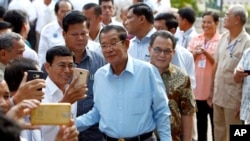On Monday, King Norodom Sihamoni will chair the first session of the newly elected Senate after an election that saw the country’s former main opposition excluded from the vote.
The ruling Cambodian People’s Party of Prime Minister Hun Sen, unsurprisingly, won a convincing victory at the polls. Political observers in Cambodia say the opening of the new Senate mandate will pave the way for more of the status quo.
Korn Savang, a coordinator of local election watchdog Comfrel, said the Senate, with no opposition voice, would remain impotent and unable to provide a check to balance the power of the CPP-dominated parliament.
“When there was the opposition party, the consideration [about draft bills] rarely occurred, so what’s happening now? One-hundred percent of members are from [the ruling party]; with this, the Senate will not be different compared to the past. This is what see,” he said.
Savang said the environment for open debate in Cambodia’s parliament and Senate was at an end as no real opposition voice remained in either house.
“If the voice of minority groups is small, there would be more problems for enacting the laws and other issues,” he said. “We will see that there will be loopholes for the minority groups.”
The Senate election was held after the main opposition party, the Cambodia National Rescue Party was dissolved last year and its president, Kem Sokha, was arrested and charged with treason for allegedly plotting with a foreign power to overthrow Hun Sen.
The election drew criticism from western governments and international observers.
Meas Ny, a social researcher, agreed with Savang that little would change following the Senate election.
“There will be nothing new. The reason was that in the past, the Senate got membership from another party. But now there is nothing. So for the Senate process, if we think about plural parties, there is nothing,” he said.
He added that without the opposition party in the Senate, there will be one less voice to counter the official narrative.
“We are aware already that the laws have a role to defend the safety of the general people, but when the Senate is under one party, if the laws are made to examine and control the people rather than for protecting the safety of the people, there will be nobody opposing those laws,” he said.
Um Sarith, secretary general and spokesman for the Senate, declined to comment on Thursday.
The Cambodian Senate has long been seen as a rubber stamp body with the balance of power falling with the ruling party and its cronies.
In 2017, amid a widespread crackdown on political dissent, the Senate approved several laws that allowed the opposition’s seats in parliament to be redistributed to other parties.
Am Sam Ath, head of Licadho’s technical investigation unit, said: “The Senate for the next mandate will be the same as before. This time it is very easy for the Senate to make a decision since there is no opposition party compared to the past.”







